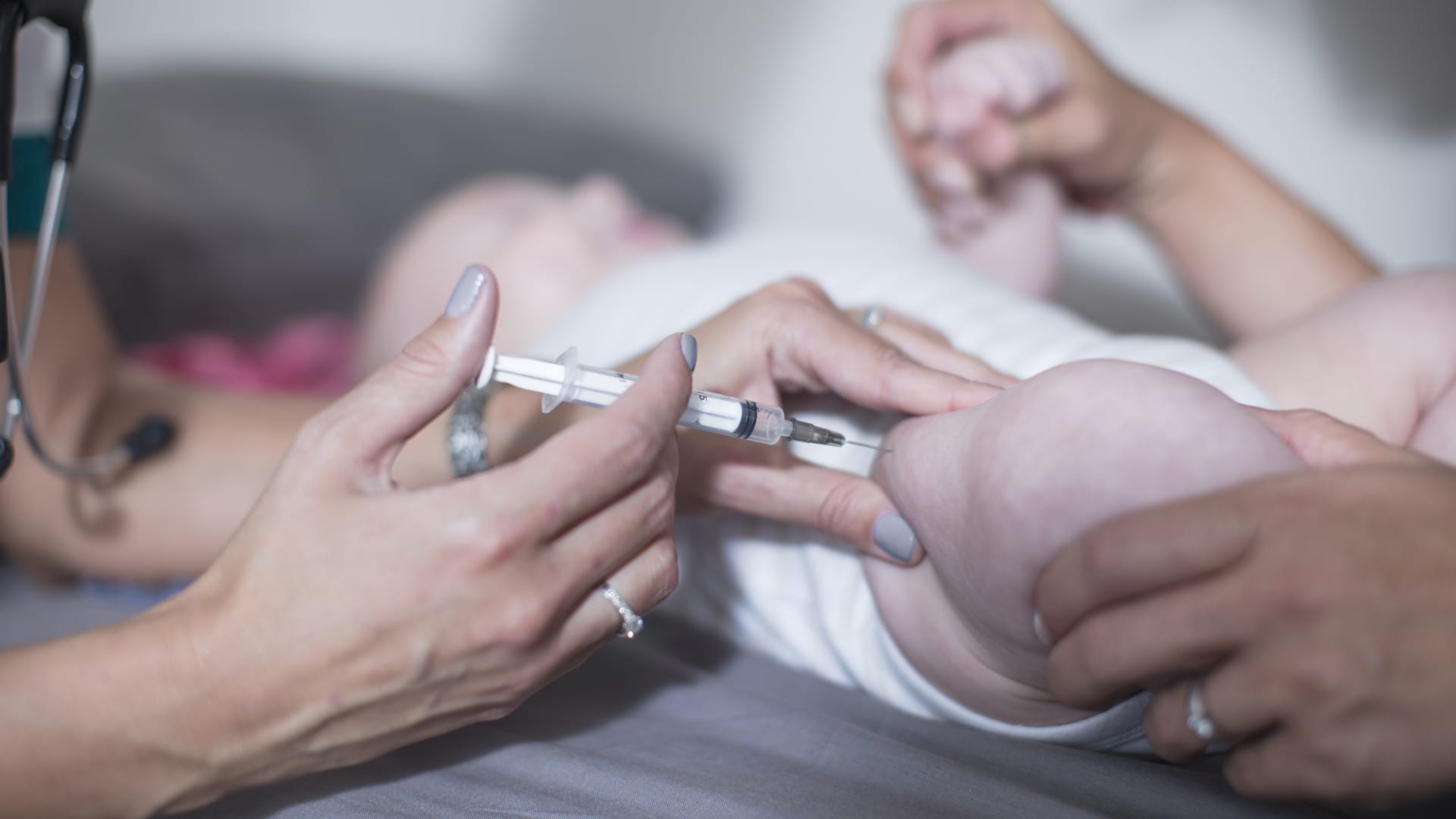A panel of independent advisors to the Food and Drug Administration unanimously recommended Thursday that the antibody nirsevimab be approved for use to protect infants from respiratory syncytial virus, the leading cause of hospitalization among newborns.
If the FDA approves nirsevimab, the antibody would become the first medical intervention available in the U.S. that can protect all infants from RSV. The FDA, which is not obligated to follow the recommendation of its advisory panel, is expected to make a final decision on nirsevimab in the third quarter.
Nirsevimab is a monoclonal antibody made by AstraZeneca. The medication would be marketed by Sanofi.
The advisory panel voted 21-0 to recommend its approval.
In a separate vote, the advisors also recommended nirsevimab’s use in children up to 2 years old who remain vulnerable to the virus in their second RSV season. That vote was 19-2.
RSV kills nearly 100 babies in the United States every year, according to scientists.
Infants hospitalized with RSV often require oxygen support, intravenous fluids and are sometimes placed on a ventilator to support their breathing.
The virus is a major public health threat. A surge in RSV infections last year overwhelmed children’s hospitals leading to calls for the Biden administration to declare a public health emergency in response.
RSV circulates at the same time as the flu and Covid-19, which puts added pressure on hospitals.
There is a second monoclonal antibody used against RSV called palivizumab. But this antibody is only for preterm infants and those with lung and congenital heart conditions that are at a high risk of severe disease. Palivizumab also has to be administered monthly.
Nirsevimab, by contrast, would also be administered to healthy infants, who make up a majority of the hospitalizations. It is also given as a single dose, which would make administration easier.
Nirsevimab is not considered a vaccine because it is a monoclonal antibody.
It is unclear whether the federal Vaccines for Children program will provide nirsevimab for uninsured and underinsured children for free because the antibody is regulated as a drug.
Nirsevimab is already approved in Canada, Europe and the United Kingdom.
Nimish Patel, an expert on medications for infectious disease, said nirsevimab performed “extraordinarily well” in both premature and term babies.
“The once-seasonal dosing is a huge advance and this is probably the closest thing to an RSV vaccine that we have and it really moves the field forward,” said Patel, a member of the FDA committee and a professor of clinical pharmacy at University of California, San Diego.
Effectiveness
Nirsevimab was up to 75% effective at preventing lower respiratory tract infections that required medical attention and 78% effective at preventing hospitalizations, according a review by the FDA.
A more conservative estimate by FDA put the antibody’s effectiveness at about 48% against lower respiratory tract infections that required medical attention. This estimate assumed patients with missing data on their health outcomes had lower respiratory tract infections that required medical attention.
Nirsevimab is administered as a single injection with the dose depending on the infant’s weight. Infants that weigh less than 5 kilograms would receive a 50 mg injection for their first RSV season, and those weighing 5 kilograms or greater would receive a 100 mg injection.
Children less than 2 years old who remain at risk for severe RSV in their second season would receive a single 200 mg injection of nirsevimab.
Safety
The FDA did not identify any safety concerns in its review of nirsevimab.
Other monoclonal antibodies have been associated with serious allergic reactions, skin rashes and other hypersensitivity reactions.
The FDA did not find any cases of serious allergic reactions in the nirsevimab trials and cases of skin rash and hypersensitivity reactions were low in infants who received the antibody. But Dr. Melissa Baylor, an FDA official, said cases of these side effects will likely occur if nirsevimab is approved.
Twelve infants who received nirsevimab in the trials died. None of these deaths were related to the antibody, according to the FDA’s review.
Four died from cardiac disease, two died from gastroenteritis, two died from unknown causes but were likely cases of sudden infant death syndrome, one died from a tumor, one died from Covid, one died from a skull fracture and one died of pneumonia.
“Most deaths were due to an underlying disease,” Baylor said. “None of the deaths appeared to be related to nirsevimab.”
There has been very close attention to safety due to historical failures in the development of RSV vaccines. Scientists first tried to develop a vaccine in the 1960s with an inactivated virus, but that shot actually made disease from RSV worse in some children when they received their first natural infection, resulting in the death of two infants.
Manish Shroff, head of patient safety at AstraZeneca, said the company will keep a close eye on the safety of nirsevimab through a large global monitoring system: “Safety is of utmost importance,” he said.
Baylor said there are also unanswered questions about how nirsevimab would interact with vaccines in development that confer protective antibodies to the fetus by administering the shot to the mother.
It’s unclear if giving nirsevimab to infants whose mothers received such RSV vaccines would provide additional protection or create potential safety issues, Baylor said.
The FDA’s advisors endorsed Pfizer’s maternal RSV vaccine that protects infants in May. The agency is expected to make a decision on Pfizer’s shot in August.
